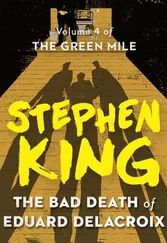Remember that, Starkey thought as his caller began to beep urgently behind him. The sound of burning bearings in the final stages of collapse is ronk-ronk-ronk .
He went to the caller and pushed the button that snapped off the beeper. “Yes, Len.”
“Billy, I’ve got an urgent from one of our teams in a town called Sipe Springs, Texas. Almost four hundred miles from Arnette. They say they have to talk to you; it’s a command decision.”
“What is it, Len?” he asked calmly. He had taken over sixteen “downers” in the last ten hours, and was, generally speaking, feeling fine. Not a sign of a ronk.
“Press.”
“Oh Jesus,” Starkey said mildly. “Patch them through.”
There was a muffled roar of static with a voice talking unintelligibly behind it.
“Wait a minute,” Len said.
The static slowly cleared.
“—Lion, Team Lion, do you read, Blue Base? Can you read? One… two… three… four… this is Team Lion—”
“I’ve got you, Team Lion,” Starkey said. “This is Blue Base One.”
“Problem is coded Flowerpot in the Contingency Book,” the tinny voice said. “Repeat, Flowerpot.”
“I know what the fuck Flowerpot is,” Starkey said. “What’s the situation?”
The tinny voice coming from Sipe Springs talked uninterrupted for almost five minutes. The situation itself was unimportant, Starkey thought, because the computer had informed him two days ago that just this sort of situation (in some shape or form) was apt to occur before the end of June. 88% probability. The specifics didn’t matter. If it had two legs and belt-loops, it was a pair of pants. Never mind the color.
A doctor in Sipe Springs had made some good guesses, and a pair of reporters for a Houston daily had linked what was happening in Sipe Springs with what had already happened in Arnette, Verona, Commerce City, and a town called Polliston, Kansas. Those were the towns where the problem had gotten so bad so fast that the army had been sent in to quarantine. The computer had a list of twenty-five other towns in ten states where traces of Blue were beginning to show up.
The Sipe Springs situation wasn’t important because it wasn’t unique. They’d had their chance at unique in Arnette—well, maybe—and flubbed it. What was important was that the “situation” was finally going to see print on something besides yellow military flimsy; was, anyway, unless Starkey took steps. He hadn’t decided whether to do that or not. But when the tinny voice stopped talking, Starkey realized that he had made the decision after all. He had perhaps made it as long as twenty years ago.
It came down to what was important. And what was important wasn’t the fact of the disease; it wasn’t the fact that Atlanta’s integrity had somehow been breached and they were going to have to switch the whole preventative operation to much less satisfactory facilities in Stovington, Vermont; it wasn’t the fact that Blue spread in such sneaky common-cold disguise.
“What is important—”
“Say again, Blue Base One,” the voice said anxiously. “We did not copy.”
What was important was that a regrettable incident had occurred. Starkey flashed back in time twenty-two years to 1968. He had been in the officers’ club in San Diego when the news came about Calley and what had happened at Mei Lai Four. Starkey had been playing poker with four other men, two of whom now sat on the Joint Chiefs of Staff. The poker game had been forgotten, utterly forgotten, in a discussion of exactly what this was going to do to the military—not any one branch but the entire military—in the witch-hunt atmosphere of Washington’s fourth estate. And one of their number, a man who could now dial directly to the miserable worm who had been masquerading as a Chief Executive since January 20, 1959, had laid his cards carefully down on the green felt table and he had said: Gentlemen, a regrettable incident has occurred. And when a regrettable incident occurs which involves any branch of the United States Military, we don’t question the roots of that incident but rather how the branches may best be pruned. The service is mother and father to us. And if you find your mother raped or your father beaten and robbed, before you call the police or begin an investigation, you cover their nakedness. Because you love them .
Starkey had never heard anyone talk so well before or since.
Now he unlocked the bottom drawer of his desk and fumbled out a thin blue folder bound with red tape. The legend written on the cover read: IF TAPE IS BROKEN NOTIFY ALL SECURITY DIVISIONS AT ONCE. Starkey broke the tape.
“Are you there, Blue Base One?” the voice was asking. “We do not copy you. Repeat, do not copy.”
“I’m here, Lion,” Starkey said. He had flipped to the last page of the book and now ran his finger down a column labeled EXTREME COVERT COUNTERMEASURES.
“Lion, do you read?”
“We read five-by, Blue Base One.”
“Troy,” Starkey said deliberately. “I repeat, Lion: Troy . Repeat back, please. Over to you.”
Silence. A faraway mumble of static. Starkey was fleetingly reminded of the walkie-talkies they made as kids, two tin Del Monte cans and twenty yards of waxed string.
“I say again—”
“Oh Jesus!” a very young voice in Sipe Springs gulped.
“Repeat back, son,” Starkey said.
“T-Troy,” the voice said. Then, more strongly: “Troy.”
“Very good,” Starkey said calmly. “God bless you, son. Over and out.”
“And you, sir. Over and out.”
A click, followed by heavy static, followed by another click, silence, and Len Creighton’s voice. “Billy?”
“Yes, Len.”
“I copied the whole thing.”
“That’s fine, Len,” Starkey said tiredly. “You make your report as you see fit. Of course.”
“You don’t understand, Billy,” Len said. “You did the right thing. Don’t you think I know that?”
Starkey let his eyes slip closed. For a moment all the sweet downers deserted him. “God bless you, too, Len,” he said, and his voice was close to breaking. He switched off and went back to stand in front of monitor 2. He put his hands behind his back like a Black Jack Pershing reviewing troops. He regarded Frank D. Bruce and his final resting place. In a little while he felt calm again.
Going southeast out of Sipe Springs, if you get on US 36, you are headed in the general direction of Houston, a day’s drive away. The car burning up the road was a three-year-old Pontiac Bonneville, doing eighty, and when it came over the rise and saw the nondescript Ford blocking the road, there was nearly an accident.
The driver, a thirty-six-year-old stringer for a large Houston daily, tromped on the power brake and the tires began to screech, the Pontiac’s nose first dipping down toward the road and then beginning to break to the left.
“Holy Gawd!” the photographer in the shotgun seat cried. He dropped his camera to the floor and began to scramble his seat belt across his middle.
The driver let up on the brake, skirted the Ford on the shoulder, and then felt his left wheels start to drag in the soft dirt. He matted the gas pedal and the Bonneville responded with more traction, dragging back onto the blacktop. Blue smoke squirted from beneath the tires. The radio blared on and on:
Baby, can you dig your man,
He’s a righteous man,
Baby, can you dig your man?
He tromped the brake again, and the Bonneville slued to a stop in the middle of the hot and deserted afternoon. He drew in a ragged, terrified breath and then coughed it out in a series of bursts. He began to be angry. He threw the Pontiac into reverse and backed toward the Ford and the two men standing behind it.
Читать дальше












